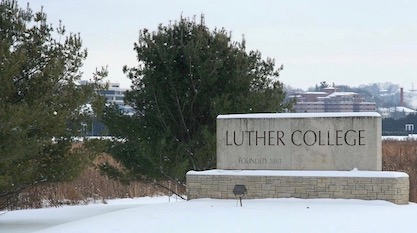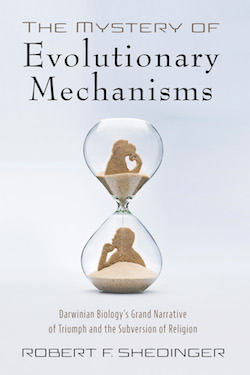 Faith & Science
Faith & Science
How Does a Religious Studies Professor Become a Darwinian Skeptic?

Editor’s note: We are delighted to welcome Dr. Shedinger as a new contributor. A Professor of Religion at Luther College in Decorah, Iowa, he is the author of a new book critiquing Darwinian triumphalism, The Mystery of Evolutionary Mechanisms: Darwinian Biology’s Grand Narrative of Triumph and the Subversion of Religion, from which this post is adapted.
For most of my fifty-nine years, I fully accepted the truth of Darwinian evolution. I knew that Daniel Dennett had called Darwin’s theory the best idea anyone has ever had and was quite familiar with Richard Dawkins’s aggressive defense of modern evolutionary theory. Moreover, I had a passing familiarity with the biological establishment’s disparaging treatment of intelligent design theory and accepted the view that ID is just a religious idea dressed up as science — that it has no scientific validity. And as a scholar committed to the academic study of religion, I found that these ideas about evolution and ID fit well with my position in the liberal academy.
A Colleague Retires
But then a senior colleague at Luther College who taught a course on science and religion retired. Wanting the course to continue, he looked to me as the person best suited to take it over. (My undergraduate degree is in civil engineering, so unlike many religion scholars, I have some scientific and mathematical background.) I was happy to do so, but I knew I had much work to do to get up to speed on the issues.
After some reflection, I decided to put the debate about evolution and ID at the center of the course. But since I had little direct experience with ID literature, I knew I needed to engage with it. That was something I did with great trepidation, feeling as though I was betraying my academic standards. I fully expected to find easily dispatched arguments full of faulty understandings of religion — my specialty. I began with Philip Johnson’s seminal Darwin on Trial, followed by Michael Behe’s The Edge of Evolution, Stephen Meyer’s Darwin’s Doubt, and Jonathan Wells’s Icons of Evolution.
Shocked, Then Intrigued

To put it mildly I was surprised — shocked would be more accurate. These books dealt with substantive scientific arguments and simply did not reflect the caricature about ID I had absorbed from the larger culture. After recovering from my shock, I became intrigued. If ID is as scientifically worthless as the biological establishment maintains that it is, why do the latter feel the need to create a caricature of the movement rather than simply engage it and show why it is wrong? Something did not seem right.
I knew I needed to have a better understanding of the position of the scientific establishment, so I used a sabbatical break to immerse myself in the literature of evolutionary biology. I began, of course, with the Origin of Species and several biographies of Darwin, then continued reading the works of many of the important figures in the development of evolutionary theory: Weismann, Bateson, Morgan, Fisher, Haldane, Dobzhansky, Mayr, Simpson, Stebbins, Rensch, Julian Huxley, Watson and Crick, McClintock, and many others.
To my utter amazement, I found this literature to be filled with caveats, hesitations, grand claims backed up by a dearth of empirical evidence, and most significantly to me, “religious” terms such as orthodoxy, heresy, blasphemy, and dogma. It became clear that a century and a half after Darwin, no one really understands the mechanisms by which the evolutionary process unfolds, and therefore that the ID position cannot simply be set aside as of no value. It has just as much of a chance of being true as the materialist Darwinian view — and probably a better chance.
A Grand Narrative
In addition, I began to identify in the scientific literature the contours of a grand narrative of Darwinian triumph that consistently overrides an honest pursuit of questions about the origin of life and its diversity. This narrative has been passed on from one generation of biologists to the next and serves to advance the guild interests of the biological establishment in maintaining biology as a purely naturalistic science. As Michael Denton has noted, Darwinian evolution is the only truly materialist understanding of evolution available. If it goes, so goes biology’s status as an exclusively naturalistic discipline. Thus the creation of the grand narrative of Darwinian triumph and its rigid policing against all attempts to supplant it.
But this perpetuation of Darwinian ideology comes at the cost of truly grappling with the profound nature of the question of biological origins. And it simultaneously subverts religion by rendering the latter nothing more than a mechanism of human adaptation with no independent truth value and no relevance to the big questions of life.
This journey of discovery over the last six years has culminated in my recently published book The Mystery of Evolutionary Mechanisms. In upcoming posts, I will provide additional detail about aspects of my argument along with comments about some of the practical implications of this work, not least being how the materialization of mind and consciousness has underwritten the development of the medicalization of mental illness over the last forty years, much to the detriment of the many people who experience emotional difficulties in their lives.
Photo: Campus of Luther College, by Jonathunder [CC BY-SA 3.0], via Wikimedia Commons.

